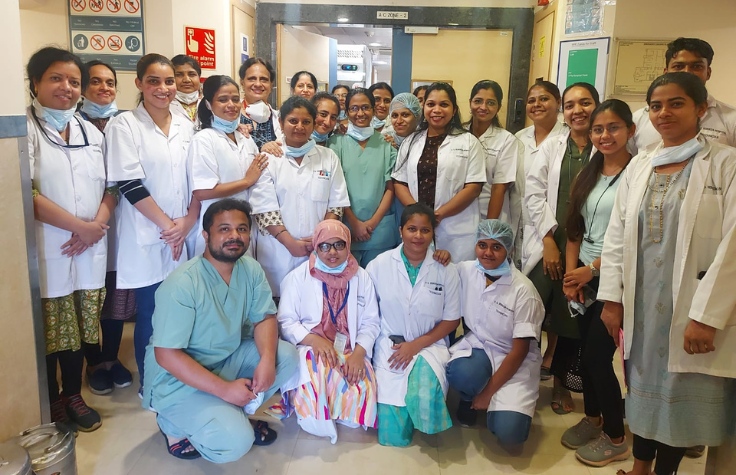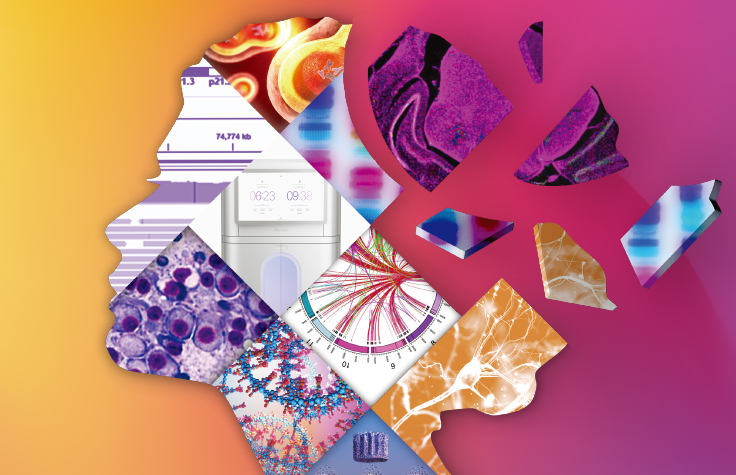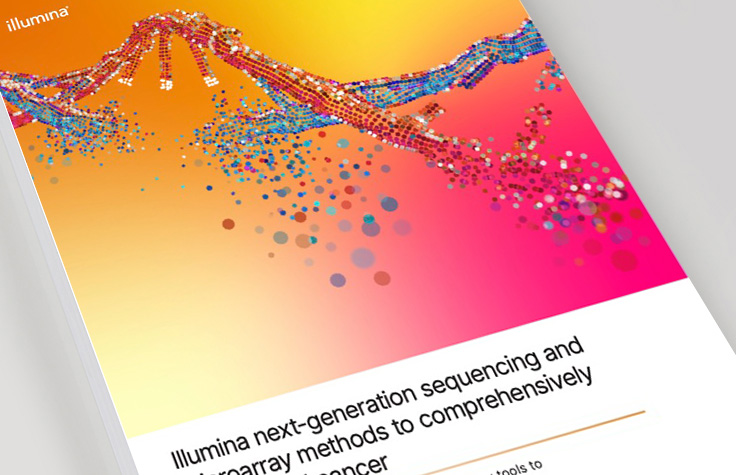Cancer Genomics Research

Advancing cancer research through NGS
Cancer is a complex, multifactorial disease that causes uncontrolled growth of cells, which can spread to other parts of the body. Interactions between cancer cells and their microenvironments affect every aspect of the cell, including the genome, epigenome, transcriptome, and proteome. Thanks to advanced tools like next-generation sequencing (NGS) and microarrays, experts have gained an unprecedented understanding of cancer biology that can lead to meaningful advances in research, personalized medicine, and more.
Pioneering cancer research solutions
NGS allows researchers to detect low-frequency molecular events associated with carcinogenesis, cancer growth, and metastasis without bias for novel discoveries. Our comprehensive product portfolio supports integrated and flexible workflow solutions for library preparation, sequencing, and analysis to study DNA, RNA, epigenetics, protein, and more to enable multiomic cancer research. We offer a range of sequencers to meet your needs, from powerful benchtop sequencers to versatile, high-throughput systems to deliver quick, accurate, and cost-effective answers for actionable insights.
New to NGS?
Learn about NGS and see the benefits that this revolutionary technology can bring to your lab! Starting from the basics of NGS to workflows, tutorials, planning and more, see how to get started today.
From cancer genomics to multiomics
Explore cancer sequencing methods and learn about the benefits of combining different omic methods to deepen your cancer research. See how cancer research applications can expand your understanding of complex disease mechanisms.
View the latest NGS-based sequencing methods to understand and detect cancer genes and transcripts. Combine multiple levels of biology to enable novel insights into cancer.
Cancer whole-genome sequencing
Explore benefits and methods for comprehensive cancer whole-genome sequencing.
Cancer whole-exome sequencing
Learn more about the advantages of whole-exome sequencing for efficient analysis of the coding region to streamline your cancer research.
Cancer transcriptome sequencing
Analyze gene expression to further your understanding of gene expression variants, mutational profiles, and more for cancer research.
Cancer epigenome sequencing
See how to capture non-genetic changes that can influence phenotypes with NGS-based techniques.
Learn about these cancer research applications to see the latest advancements in cancer detection, characterization, and analysis using NGS.
Immuno-oncology research
Learn how to use NGS to study immunotherapy response factors, discover biomarkers, and apply genomics to personalized immunotherapy.
Cancer single-cell analysis
Resolve cancer samples at the single-cell level for detailed insights into the complex biology of cancer.
Liquid biopsy research
See how NGS can be combined with liquid biopsy research to detect and characterize various cancer-derived biomarkers.
Resources for cancer research
Explore videos and resources advancing cancer biology and research using NGS techniques and applications.

Advancing cancer research with multiomics
See the video to learn how researchers at the Ontario Institute for Cancer Research and United Health Network link complex phenotypes through multiomics to enable discoveries that weren’t possible before.

Single-cell multiomics beyond RNA-Seq
In this webinar, Dr. Michael Kelly discusses the use of single-cell and spatial technologies to advance basic science and translational research.

2023 Multiomics eBook
See how to use multiomics to better connect genotype to phenotype and obtain a full cellular readout not found through single omics approaches.
Comprehensive cancer research workflow solutions
Illumina NGS and microarray cancer workflows are part of a comprehensive solution, starting with sample preparation, followed by library preparation for sequencing, and ending with data analysis. Streamlined library prep workflows and flexible kit configurations accommodate multiple study designs.
Prep
Library prep overview
Learn about innovative sequencing library preparation methods to suit any need.
Library prep and array kit selector tool
Find the right sequencing library preparation kit or microarray for your application.
Sequencing or arrays
Sequencing platforms
Find the right sequencing platform to fit your needs, from benchtop to production-scale sequencers.
Microarray scanners
Compare array scanning systems for rapid, sensitive, and accurate results for genetic analysis.
Data analysis
Informatics products
See how Illumina software products can offer solutions for any workflow.
BaseSpace Sequence Hub
Explore features and benefits of BaseSpace Sequence Hub, a direct extension of your Illumina instruments.
DRAGEN secondary analysis
Transform data into insight with Illumina DRAGEN secondary analysis with accuracy and efficiency.

Cancer Research Methods Guide
The Cancer Research Methods Guide is a 40+ page comprehensive resource with simple, comprehensive workflows for a broad range of cancer research applications. This guide includes single-cell sequencing, spatial sequencing, methylation profiling, multiomics, cell-free RNA sequencing, and more.
Download free guideAdditional resources
Sequencing platforms
Our innovative next-generation sequencing (NGS) platforms deliver exceptional data quality and accuracy at a massive scale. View benchtop and production-scale sequencer comparison tables.
Cancer research feature articles
Read featured articles on cancer research from scientists worldwide covering a broad range of topics.